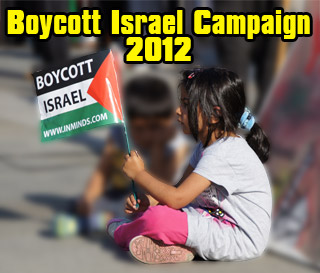
 Innovative Minds © 2014. All Rights Reserved. www.inminds.co.uk | |
|
[Lebanon] Hezbollah seizes initiative as Israel is racked by doubtHala Jaber, The Sunday Times 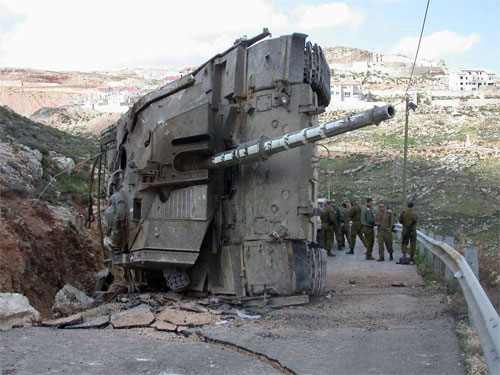 Israeli Merkava tank destroyed by Hezbollah Soon after 34 days of ferocious fighting in Lebanon came to a sudden halt last Monday, Salim al-Tayeb made his way cautiously to the edge of his village in the south of the country to retrieve the bodies of three Hezbollah comrades-in-arms from beneath a heap of rubble. His friends had been among the last of more than 1,300 people to die in the war and al-Tayeb wanted to make sure they were not left to rot where they lay, as so many others had been. 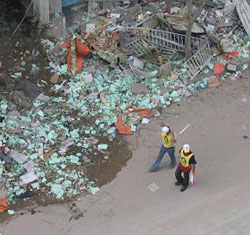 These two Hezbollah volunteers are going building to building to assess the damage done to apartments in the Dahiyeh building. âWe did preliminary assessments during the conflict on a daily basis,â one engineer told us, âand now we are going back through to see if the apartments are totally destroyed or can be repaired. We have given out a hotline number to people to call us so we can come and give them assistance. If their apartment is not livable, we will give them money to rent an apartment until we can rebuild one for them.â Photo Credit: Refugees International, 08/17/2006 One by one, he hauled the bodies into the sunshine. Then he bowed his head as a Red Crescent ambulance drove them away. It was two days before he allowed himself to share in the exultation that swept through Hezbollah ranks at the end of a conflict that many of the men had not expected to survive. Yet for al-Tayeb, 40, there was a special reason to savour the moment. âI havenât even seen my newborn baby boy,â he explained with a smile when I found him feasting on kebab sandwiches at a âvictoryâ lunch laid on by the mayor in Taibe, their village two miles from the border. Al-Tayeb had just telephoned his wife in Beirut. It was the first time they had spoken since the birth and he admitted shyly that he had said he missed her, loved her and yearned to see her. He had held back tears, he said, for fear of seeming weak to his other children, a girl of eight and a five-year-old son. âAll they know is that their father is away working.â A different type of work now awaits al-Tayeb. He is not one of Hezbollahâs 2,000 or 3,000 full-time military elite, but serves in its reserves, estimated at between 8,000 and 13,000 strong. For 20 years, he has fought when the need has arisen. But in civilian life he is an engineer and his skills are in urgent demand as Hezbollah launches a new battle to lead the reconstruction of the groupâs shattered Shiâite strongholds in south Lebanon and the southern suburbs of Beirut. The campaign was getting under way in earnest this weekend. Fighters exchanged rocket launchers and military fatigues for bulldozers and brooms as they confronted the destruction they had brought down on Lebanon when they captured two Israeli soldiers during a cross-border raid on July 12. 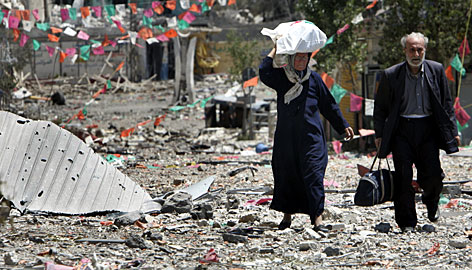 A Lebanese couple in the southern town of Bint Jbail after Israeli destruction. Far from resenting Hezbollahâs provocation, most of those returning to their ruined villages seemed to admire the fightersâ resilience in having prevented the mighty Israeli army from rolling effortlessly through south Lebanon as it has in the past. Despite their grief for family and friends who died and their shock at the heart-stopping scale of the devastation, Hezbollah is rallying them to its cause by offering cash, comfort, professional expertise and slick organisation that less efficient government officials can only marvel at. In these critical first days after the war, Hezbollah and its financial backers in Tehran have seized the moment. They are appeasing those who might have been expected to denounce Hezbollah from the wreckage of their homes. And they are entrenching their support among a growing army of sympathisers. Iranâs money is crucial. Estimates vary widely, but one Hezbollah source said as much as $1 billion had been made available by Mahmoud Ahmadinejad, Iranâs president; another that the Iranian leader had placed no limit on the money pouring in. King Abdullah of Saudi Arabia has promised the Lebanese government $500m and Kuwait another $300m. But Hezbollah is giving Iranâs money directly to the people â a yearâs rent for a homeless family here, a bundle of notes for some new furniture there, up to $12,000 per family within 48 hours of registration. The money buys loyalty to the âParty of Godâ as well as the basic necessities. The peace, like the war, is shedding new light on the organisation. Hezbollah has been widely portrayed in the West as a ragtag army of terrorist hotheads. Yet it has withstood the Israeli onslaught that was intended to crush it. 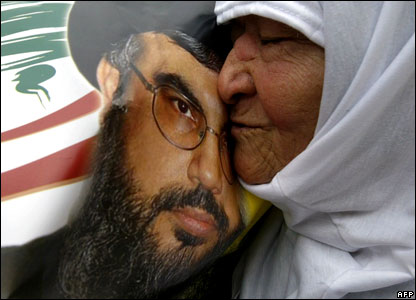 A Lebanese woman kisses a poster of Hezbollah leader Hassan Nasrallah. Sayyed Hassan Nasrallah, the leader that Israel set out to kill, has not only survived but has also resurrected Hezbollahâs operations on the ground within days of the ceasefire. Nasrallah is being praised in Lebanon and across much of the Middle East for having achieved the simple objective he set his group at the start of the conflict: to remain viable. Nasrallahâs declaration of âhistoric victoryâ, though derided by Israel, has raised questions about the feasibility of enforcing the United Nations resolution that ended the conflict â and about Hezbollahâs future role in Lebanon and the wider Middle East. Security council resolution 1701 envisages that Hezbollah will remove its fighters from southern Lebanon and allow the Lebanese army and a beefed-up UN force to take their place; and that it will surrender its weapons. âAnything less would mean that the resolution is not being implemented,â said Mark Regev, Israelâs foreign ministry spokesman. Yet last week Nasrallah vowed that his group would not be disarmed by âintimidation or pressureâ. The Lebanese army pressed on with an operation to establish 15,000 soldiers in towns and villages south of the Litani river, an area that has been Hezbollahâs preserve for the past 24 years. But nearly 60% of the soldiers are Shiâite. Many of them are from the same southern villages as Hezbollahâs fighters and support them. Some have brothers and cousins in the organisation. 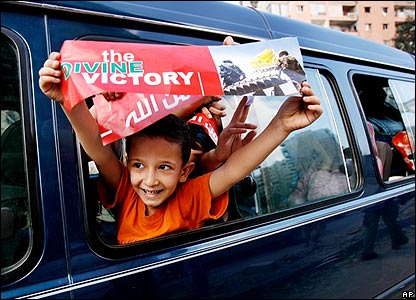 The Divine Victory Mindful that any confrontation would split the army and raise the spectre of civil war, Elias Murr, the defence minister, has declared emphatically that his soldiers have no intention of disarming Hezbollah. âThe army is not going to the south to strip Hezbollah of weapons and do the work Israel did not,â he said. Instead, a compromise of âhide and not seekâ has been reached: Hezbollah will keep its weapons out of sight so that the army is not obliged to confiscate them. The United Nations is trying to assemble a force of 15,000 but only the first 3,500 are expected to arrive within the next 10 days and some might take up to a year to arrive. Hezbollah perceives no greater threat from the UN force than it does from the Lebanese army. Officials point out that it has lived with UN forces for years and expects to cohabit just as comfortably with this one. Apart from Italy, which has offered 2,000 to 3,000 soldiers, the biggest contingents pledged so far are from Muslim Indonesia and Malaysia which, like Hezbollah, do not recognise Israelâs right to exist. The Israelis have protested and the UNâs deputy secretary-general, Mark Malloch Brown, called for more European countries to send troops in the first wave. Although 50 French troops arrived yesterday, Malloch Brown expressed disappointment that France, which originally offered to lead the force, had promised only 200. Nor does there appear to be any imminent prospect that Hezbollah will release the Israeli soldiers Ehud Goldwasser, 31, and Eldad Regev, 26. Nasrallah said no power on earth would make him set them free unless Lebanese and other Arab prisoners held in Israeli jails were released in return. As for the demand that Hezbollah be removed from southern Lebanon, the reunions of fighters with their families in villages south of the Litani river last week emphasised the practical difficulties. On his return to Taibe, Haider Fayad, a lean fighter aged 27 with sparkling green eyes, was embraced first by his mother Hajeh Zainab. In her elation after 35 days apart, she kissed his head, shoulders and chest, crying: âMy love, my heart, my eyes.â Then Fayadâs wife Fatima appeared, dressed in a black chador. She hugged him fiercely from behind, kissing his back again and again in an unusual display of intimacy. âI love him to bits. I love him to death,â she said. Fayadâs four brothers are also in Hezbollah and their mother is proud of what they do. Many of the organisationâs fighters are men like these who grew up in the southern villages. They live and work there when not fighting. Their families have been rooted in these villages for generations and intend to remain for generations, whatever any UN resolution might say. From interviews with fighters in the past few days, three reasons emerged as to why they feel no pressure to leave southern Lebanon, let alone lay down their arms. The first is their euphoria over what they regard as the triumph of the military tactics they deployed to resist Israelâs offensive. They had prepared meticulously, stockpiling ammunition and training highly mobile units of ambush and anti-tank specialists to evade Israeli ground forces while maintaining contact with their commanders. These units proved particularly elusive from the air. âEvery step we made, every rocket we fired was following specific orders from the leadership,â said Abu Mohammed, a Hezbollah medic who took part in anti-tank operations. âThe Israelis forgot that this is our land. We know every contour of the landscape.â The second reason for Hezbollahâs defiance is the reaction of 1m people to having been driven from their homes. Thousands streamed back last week to find entire areas flattened and their houses pancaked and pulverised. Many wept and railed, yet their anger was directed not at Hezbollah for picking the fight with Israel, but at the Israeli forces for wreaking such devastation. 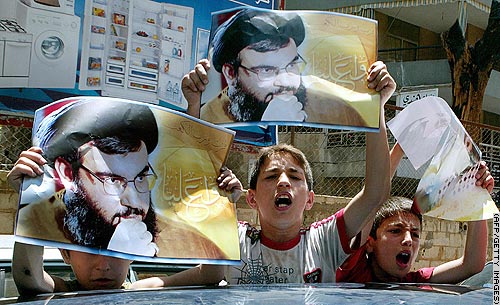 Lebanese children carry posters of Hezbollah leader Hassan Nasrallah, rejoiced in the streets Children summed up the mood as eloquently as anyone. Hassan Mussa, 14, and his 11-year-old brother Hussein, searched the debris of their home in vain for their PlayStation and a new bicycle. âThe Israelis must pay us back,â Hassan said angrily. I accompanied Yunis Awdeh, a 47-year-old father of three whose flat in Beirutâs southern suburbs had been destroyed, on his journey back to the town of Khiam, where he found the family home in ruins. Scrambling over the stones, he squeezed himself into what had been the sitting room. âWhere are my motherâs sofas, where is the bedroom, where are the beds? Look, that was my favourite blanket,â he said, pointing to a blue rug outside. Then he intoned a phrase which is strange to western ears but was repeated over and over again by people who had lost everything: âThe sacrifice is worthy of the resistance and Nasrallahâs shoes.â The loyalty commanded by the belligerent yet humble Nasrallah constitutes the third reason for Hezbollahâs air of resolution. Some fighters cried during a broadcast in which he said he kissed their feet in honour of their bravery on the front lines. Hezbollahâs ability not only to withstand the Israeli attacks but to create mayhem in northern Israel has earned Nasrallah stellar status in much of the Arab world. Babies are being named after him, jewellery stamped with his face is suddenly in fashion and mobile ringtones can be heard of songs in praise of him. Hezbollahâs performance has emboldened the leaders of Syria to talk of retaking the Golan Heights from Israel and Iran to dismiss the latest international demands for a halt to its nuclear programme. Little wonder that Nasrallah shows no sign of yielding to critics at home or abroad. One such critic, the Druze leader Walid Jumblatt, warned that Hezbollah, which controls 14 of Lebanonâs 128 parliamentary seats and two cabinet posts, had achieved a dangerously disproportionate influence that could condemn the south of the country to remain a battleground. âWe donât want Lebanon â or south Lebanon specifically â to be a testing ground for pre-emptive wars by America and Israel against Iran and Syria or the other way around,â he said. For now the fightersâ families are celebrating reunions. But if the violence returns, they will not stand in Hezbollahâs way. âOur wives understand the men they are married to,â said al-Tayeb, the engineer. âIn general they are women who have been brought up with the same mentality and ideology: Israel is our enemy, fighting the enemy is a religious and moral duty and martyrdom is an honour.â
Source: http://www.timesonline.co.uk/tol/news/world/article614228.ece Related ArticlesAlso Of InterestPage URL: http://inminds.com/article.php?id=10129
|
|
Support Us
If you agree with our work then please support us.Campaigns INMINDS Facebook Live Feed Latest Video's
INMINDS Twitter Feed Tweets by @InmindsComFeatured Video's
You need Flash player 8+ and JavaScript enabled to view this video.
[all videos (over 200)..] Featured MP3 Podcast 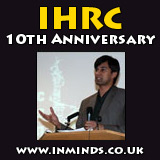 "They [Met Police] initially denied it, that they had sent officers to Israel to find out how to deal with suicide bombers. When I asked them would you have done the same thing after the Brixton riots and sent people to South Africa (under the apartheid regime) to find out how to deal with black people? They didn't have an answer. I asked the question 'do you have a shoot to kill policy?', they said no they didn't, over a number of years, and then it was finally, tragically, proven that they did have.. we finally cut our ties [ceased meetings with the Met Police in protest], I came out thinking of the police as insincere, hypocritical, having double standards." Islamic Human Rights Commission Islamic Human Rights Commission 10th Anniv. Nov 2007 [15min / 7Mb] [all podcasts..] Newsletter Feedback |
 |
 |






















